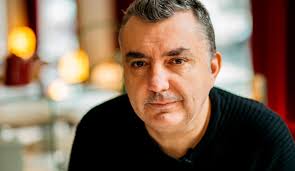I once knew a writer who’d been diagnosed with bipolar disorder, a charismatic, chatty Harvard graduate who brought a Renaissance approach to a new science. A lover of literature, she’d tired of prescriptive jargon about diets and antidepressants and had gone back to The Anatomy of Melancholy to divine meaning in her mood swings. First published in 1619 by Robert Burton, an English scholar and ordained Anglican minister, Anatomy isolated the melancholic from its fellow humors, or temperaments – phlegmatic, choleric, and sanguine – to discern the root of his own emotional struggles, and those of others. Conceived as a medical guide – there’s quite a bit about the clinical effects of bile — Burton’s text quickly outgrew its frame: the author revised it five times, expanding its scope, seasoning each edition with his own erudition. The Anatomy of Melancholy, then, is a triumph not only of the science of its times but also of philosophical treatise and literary criticism.
 I thought about this acquaintance’s obsession with Burton as I read Manuel Vilas’ enthralling autofiction, Ordesa, which recounts the Spanish writer’s bout with a midlife crisis, choosing, like Burton, to exalt melancholy as an unlikely muse, the darkness as a door back into the light. “None of us knows how we’re going to die, and our squeamishness about this is melancholy,” Vilas observes. “We need the tradition of melancholy to return to the world. It’s a word nobody uses any more. Melancholy is called obsessive-compulsive disorder now.”
I thought about this acquaintance’s obsession with Burton as I read Manuel Vilas’ enthralling autofiction, Ordesa, which recounts the Spanish writer’s bout with a midlife crisis, choosing, like Burton, to exalt melancholy as an unlikely muse, the darkness as a door back into the light. “None of us knows how we’re going to die, and our squeamishness about this is melancholy,” Vilas observes. “We need the tradition of melancholy to return to the world. It’s a word nobody uses any more. Melancholy is called obsessive-compulsive disorder now.”
As with all autofiction, Vilas’ narrator is a stand-in for the author. He was born in 1962 to working-class parents in Barbastro, a town in Aragon. Nearby the Pyrenees offered a hiker’s paradise. His parents had scrambled up from the peasantry and settled, fitfully, into the lower-middle-class. Manuel studied literature at the University of Zaragoza. After a dispiriting stint as a high school teacher, he embarked on a career as a writer, winning accolades for poetry and fiction. (Last year Ordesa was awarded France’s prestigious Prix Femina Étranger and became an international bestseller.)
But there was a canker in the rose of his success. In 2015, following the death of his mother, and a decade after his father succumbed to colon cancer, a devastated Vilas plunged into a reckoning with their loss. What unfolds, then, is raw, resonant storytelling, shifting back and forth in time. It’s no accident that he can’t link particular events, such as his grandmother’s funeral, to specific years; he twists Ordesa in the service of an unreliable narrator: “In my family we were never precise in our narrations … This is something I have inherited in my storytelling. It’s not lying. It’s just the fear of making a mistake, fear of putting your foot in it, dread of other people’s atavistic judgment.”
If the chronology lacks shape, the voice is commanding. Vilas metes out his story in a lyrical stream that nevertheless moves with purpose and calculation. His gifted translator, Andrea Rosenberg, teases out a wealth of detail and flickering nuances. She ably captures, for example, a page-long single sentence in which Vilas mulls his father’s excised tumor much as Hamlet contemplated Yorick’s skull, connecting his father’s “black lump” to his own imagination feeding on mortality.
Ordesa evokes a Spain in transition after the death of Franco into the upbeat tempo of La Movida, shaking off the straitjacket of the old fascist order and embracing a more open, pluralistic future. Not all Spaniards felt welcome to the party; as a lower-middle-class family, the Vilases were often stalked by the peril of financial ruin. They took up their own diversions. His father lavished attention on his car. His mother designed a dining room to impress her friends; and when the twenty-year-old Manuel won a literary prize worth 20,000 pesetas, she stole it all and splurged on bingo.
 From this fraught background emerges a wreck of a man. For years Vilas languished as a high school Spanish teacher, drilling grammar and punctuation into listless students. He grappled with alcoholism and indulged in affairs. After a painful divorce, he tries to forge deeper relationships with his two sons, whom he calls Vivaldi and Brahms, or Valdi and Brah for short. Vilas uses the names of composers as aliases for his extended family, a playfulness that cuts against the novel’s bleakness.
From this fraught background emerges a wreck of a man. For years Vilas languished as a high school Spanish teacher, drilling grammar and punctuation into listless students. He grappled with alcoholism and indulged in affairs. After a painful divorce, he tries to forge deeper relationships with his two sons, whom he calls Vivaldi and Brahms, or Valdi and Brah for short. Vilas uses the names of composers as aliases for his extended family, a playfulness that cuts against the novel’s bleakness.
Literature offers one path out of his personal labyrinth. Politics is another, as Vilas reinterprets Spanish history from the 1960s until now, a sense of revolution in the air. “Hierarchies are breaking down,” Vilas writes. “The ancient régime is breaking down. History, like water, flows on where you least expect it … subversive, liberating.” This mesh of forms and themes suggests a range of influences, Burton and Dante among them, even as Vilas circles back to the ghosts of father and mother. Rosenberg’s translation strikes gold: “My father became electricity, and cloud, and bird, and song, and orange, and tangerine, and melon, and tree, and road, and soil, and water. And I see him whenever I try to see myself. His high laugh tumbling over the world.”
Vilas’ mother declines almost a decade later, ravaged by Alzheimer’s. He finds a fresh vulnerability not only in her but also in his role as caretaker. “My mother became a little girl and hid whenever it stormed. Not just in the wardrobe and pantry – under the bed too. I was a little boy watching magic dissolve his mother’s bonds to space and time. Suddenly, my mother wasn’t there. And I’d search the house for her as summer storms swelled the sky, turned the heavens into a thousand bits of solid light. And then the two of us would be a little boy and a little girl with an undefinable, cursed kinship. Come, come hide here with Mom, hold Mom’s hand, the world is a wicked place.”
The novel gradually homes in on its primal myth: a childhood trip to the resort mountain valley of Ordesa, suffused in a gauzy yellow light. He recalls a flat tire on a highway, the hotel where his family stayed. Here Vilas’ prose takes on an incantatory urgency: the fulcrums of our lives are many, scattered across decades: we must revisit them all. The unexamined life truly isn’t worth living, and it’s this insight that allows Vilas to wring meaning from the mundane as well as the monumental.
 In its last 50 pages, the book takes a Bergmanesque turn, ponderous, self-lacerating, drenched in sorrow. Which brings us back to Burton. The Anatomy of Melancholy anticipated today’s breakthroughs in neurobiology by four centuries. We now understand that the unconscious rooms of our brains – locked up with curtains drawn, sheets draped across furniture — account for up to 90% of our behaviors. Our desire to know ourselves fully, our yearning to hold onto our parents and those early intimacies — they elude us as we age. Vilas mirrors the science by reclaiming melancholy in the Burton sense of the noun, as essential to our humanity.
In its last 50 pages, the book takes a Bergmanesque turn, ponderous, self-lacerating, drenched in sorrow. Which brings us back to Burton. The Anatomy of Melancholy anticipated today’s breakthroughs in neurobiology by four centuries. We now understand that the unconscious rooms of our brains – locked up with curtains drawn, sheets draped across furniture — account for up to 90% of our behaviors. Our desire to know ourselves fully, our yearning to hold onto our parents and those early intimacies — they elude us as we age. Vilas mirrors the science by reclaiming melancholy in the Burton sense of the noun, as essential to our humanity.
But there’s a light ahead: self-reliance. Distanced from his sons, grieving his losses, Vilas digs deep. “Maybe that is the pinnacle of identity: oneself being sufficient in all things. If you throw a party, an immensely important guest shows up, and that guest is you; if you get married, you’re madly in love with your spouse because your spouse is you; if you die and come back to life and see God, you’re immensely perplexed because you’re seeing your own face . . . It’s like that having understood that solitude is a law of physics and matter, a law that infatuates. It’s the law of the mountains. The law of Ordesa. The fog swaddling the peaks. The mountains.”
[Published by Riverhead Books on December 1, 2020, 304 pages, $28.00 hardcover]